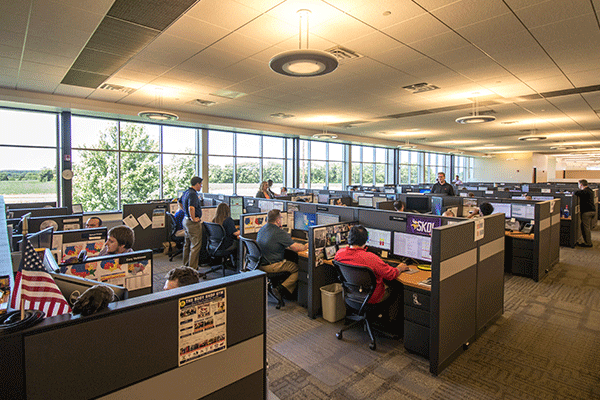
Sales are a foundational piece of every business. Without the ability to sell their product or service by appealing to their market of choice, no company could survive.
Sure, plenty of good products fly from store shelves following release and great service providers can become an irreplaceable extension of their client’s world. But still, at some point, a salesperson had to entice their prospective customer into taking that first step, toward dipping their toe into an investment that — at the time — could’ve gone either way.
Yeah, it’s fair to say that the journey of every great company started with nothing more than a simple, transformational, sale.
If you’re interested in a sales career — particularly in the transportation industry — there has never been a better time to begin your search. Worldwide business is booming and great transportation companies are continually looking to add great salespeople, like you, to their workforce.
A career selling logistics solutions often comes with long-term growth opportunities, above-average earning potential and the ability to make a lasting impact on your business of choice.
Pretty intriguing, right?
Here at Anderson Trucking Service (ATS), we currently employ more than one hundred transportation sales representatives in several locations across the United States. As a result, we understand what a career in sales will look like — including the most common challenges you will face as a sales professional.
To give you the information you’ll need to make the best possible decision in your next career choice, this article will outline the largest roadblocks to success in a sales position and give you some tried-and-true tactics for overcoming them.
The 8 largest challenges sales professionals face in the transportation world, and many other industries, are:
- Maintaining a healthy work-life balance
- Getting comfortable with rejection
- Staying motivated
- Learning how to sell logistics solutions
- Building and fine-tuning logistics expertise
- Maintaining customer relationships
- Prospecting potential deals
- Bearing bad news when things go wrong
1. Maintaining a Healthy Work-Life Balance
Iconic country music star, businesswoman and humanitarian, Dolly Rebecca Parton Dean — known professionally as Dolly Parton — is quoted as saying, “Never get so busy making a living that you forget to make a life.”
Boom.
Truer words have never been uttered. Truly.
Granted, the estimated 300 million dollars that Dolly has accumulated over her years in the entertainment business, doing everything from acting and authoring to singing and dancing, might beg to differ. That kind of fortune isn’t made overnight but rather through years of hard work, sacrifice and a mindset of dedication.
But Dolly was right. Life is all about balance and a good life comes with a mixture of all things, not just work.
That said, logistics sales professionals — especially those just starting in this profession — sometimes find it difficult to reach balance in their lives. Instead of achieving the homeostatic balance between work, love and play, many sales reps dedicate themselves to the task at hand — growing and maintaining their book of business.
Success in a sales job is about more than working 60-hour weeks in pursuit of increased commissions. But sometimes time at the office — covering for colleagues, squeaking out an extra sale and prospecting new opportunities — takes over a sales representative’s day.
You’ll want to avoid this wherever possible, especially with the enticing earning opportunity presented by the logistics sales.
How to Overcome Work-Life Balance Issues
As you slide into a new sales position — in the transportation world or otherwise — set boundaries from the start. Meet with your manager and outline any goals you have for the next 90 (or so) days. During this discussion tell them about the hours you’re looking to put in each week and when you plan to be fully unavailable.
Make the most of your time. Achieving a work-life balance is about maximizing both your work and personal life. Often times career professionals forget to set personal development goals for themselves, creating an imbalance in their work-life balance. Provided you’re goal-oriented on both ends of this spectrum your sales career will see your flourishment both personally and professionally.
A good company — with a culture you’ll succeed in — will do everything they can to help you achieve your work-life balance goals. Businesses that care about their employees give them every opportunity to succeed both in and outside of the office. As such, don’t be afraid to set goals and boundaries where your work-life balance is concerned — particularly as you transition into a position in the transportation industry.
2. Getting Comfortable With Rejection
One of the largest advantages of working in a sales role is the opportunity to control your earning potential. By developing a customer base and working with them to reach shared goals, achieving this end will only get easier over time.
That said, the beginning stages of this process — particularly for people that are new to selling — can be trying both mentally and emotionally. No one succeeds as a transportation solution sales professional without being intimately familiar with the word “no”.
In the early days of your career, phrases like “No thanks, we’re good” and “I’m not interested at this time, thanks” will become some of your closest companions — second only to that 8 a.m. cup of piping hot joe.
Successfully navigating continual rejections will, for many people, be the largest challenge they face in their logistics career. But the word “no” doesn’t need to set you back or keep you from reaching grander pastures.
How to Get Comfortable With Rejection
When it comes to taking rejection in stride, separating your emotions and ego from your sales process will go a long way. Rejection can be deflating for the salespeople that struggle to untie their emotions from the selling process.
Don’t take it personally because it’s not. Instead, think of every rejection as an opportunity to save time going forward. This prospect has made it easier for you as you won’t need to waste time qualifying and nurturing them further. Most importantly, training yourself to have a short memory is crucial in any sales role. Remember the good, forget the bad and watch the customer relationships pour in with increased frequency.

3. Staying Motivated
In any job, no matter what the day-to-day activities entail, maintaining the motivation to persevere through tough times can be difficult. Salespeople face these challenges too.
Although repeated rejection from prospects serves to motivate some individuals, others experience the opposite. And, when what they see as “failures” begin to pile up, it’s not uncommon for inexperienced representatives to lose the motivation to continue.
This can be especially challenging for sales professionals that make money based on commission-based compensation structures where their level of motivation directly impacts their earning potential. As such, finding a way to come to work motivated to push the needle a bit further each day will be a crucial part of your sales journey.
How to Overcome Motivation Issues
Most sales jobs will ask you to work as a member of a team, developing competencies as a group and learning with each customer interaction. Some of your team members will have more experience than you, others will have less.
Lean on these team members. Ask them questions whenever you have them and for any selling tips they can provide. Learn from their mistakes and spend time with them between calls. In time, your expertise will mirror theirs and the motivation to pursue even the most difficult sale won’t be hard to find. 
4. Learning How To Sell Logistics Solutions
No one is born knowing how to sell. Even though every product and service is different, the fundamental skills needed to sell them are consistent across offerings.
Starting a sales career in the transportation industry can be challenging due, simply, to a lack of experience in the sales world. Without the vocabulary, confidence and personality needed to build trust, new sales professionals find their jobs more difficult than they bargained for.
Rest assured though, selling transportation solutions is a learned skill.
Related Content: How to Make it Through Your First Year in Logistics Sales
How to Learn to Sell Logistics Solutions
Overcoming this challenge will take time, dedication, repetition and the presence of a good mentor. For new hires, good companies have sales representative training programs designed to give employees the tools they’ll need in their latest position.
That said, these training programs are fleeting and learning how to sell something will take practice. But given enough time, practice will make perfect.
Some of the most prominent skills that sales professionals develop overtime and employ to help them sell are:
- Confidence
- A unique voice of trust
- The ability to relate to others
- An easy-going nature
- Comprehensive understanding of what problems their services solve
One of the easiest ways to develop these, and sales skills like these, is to participate in mock interactions. Partner up with some other representatives in your organization and practice selling to one another. Try to incorporate the common objections you’ll face during prospect interactions.
Great logistics companies — be it a freight brokerage, trucking company or otherwise — will regularly facilitate these sessions to ensure your skills are as sharp as possible.

5. Building and Fine-Tuning Logistics Expertise
If you’re looking to sell something, understanding what you’re selling — whether it’s transportation services, a software system or any mix of other things — is crucial.
People only like to purchase products from the best in the business. And, even if a company’s product is the best — outmatching the competition in quality, design and value — someone still needs to sell it. Promoting transportation solutions successfully, however, will take a comprehensive understanding of what your company brings to the table, what sets it apart and what problems its services solve.
New logistics representatives sometimes run into trouble when they don’t understand exactly what they’re selling — this is increasingly the case due to the complexity of the transportation industry.
Instead of displaying their offering as the solution to a prospect’s problem, these sales representatives get caught up discussing pricing alone and fail to highlight key details.
How to Build and Fine-Tune Your Expertise
It’s highly recommended that each sales member puts in the time to learn the transportation/logistics services they'll be selling before they start the process of selling it.
From a customer’s perspective, this makes a lot of sense; without a comprehensive understanding of what they’re getting from a purchase, responsible buyers simply won’t buy. As a result, the expertise that a salesperson projects is really important.
Make sure to put in the time, learn your business's services, work with other salespeople to iron out your understandings and ask your employer for the opportunity to get hands-on with everything they expect you to sell.
6. Building and Maintaining Customer Relationships

The transportation world is all about relationships. Building trust with customers and partners is a foundational piece of any salesperson’s long-term achievement. For sales professionals working to sell transportation services, customer satisfaction is, and should be a top priority.
Following the initial transaction, a salesperson’s relationship with their customer begins. And, in the interest of repeat business, it’s that representative’s job to temperature check, touch base and work alongside that customer into the future.
Maintaining customer relationships takes time, energy, organization and planning on a logistics professional’s behalf. When done correctly, these relationships can be mutually beneficial and extend beyond the business world.
However, preserving relationships isn’t always easy — even if doing so is your job.
Beyond this, not all customer relationships are created equal and, in some situations, hard-to-please clients can be trying on their transportation representative. You’ll want to develop tactics for handling difficult customers and maintaining healthy relationships with the best ones.
How to Build and Maintain Customer Relationships
Overcome this challenge by pinpointing areas of interest in each of your clients. Always remember: they are human beings with passions and goals similar to yours. As such, continuously work to relate to their human experiences, we’re all going through life together, we're just in different spots.
That said, boundaries are also an important piece in promoting healthy provider-customer relationships. Working relationships in the transportation world should have a clear set of boundaries while at the same time promoting the accessibility that customers value.
7. Prospecting Potential Deals
Time is a salesperson’s most valuable asset. For this reason, protecting it is important. Spending too much time running down unqualified leads can hinder a logistics professional’s productivity — and when you’re in sales, productivity is important.
If you decide that a sales career in the transportation industry— a career that can be incredibly fruitful — is your best path forward, you’ll want to iron out your prospecting processes.
Understanding which customers are worth pursuing and those that aren’t before starting the process of reaching out to them is a learned skill that good salespeople develop over time.
How to Overcome Prospecting Issues
Developing a comprehensive understanding of your company’s ideal buyer — a persona that should’ve been previously developed — will help you avoid pursuing less-than-ideal prospects.
Your business is likely looking to offer a specific grouping of transportation services at the highest level. For this reason, you'll want to make sure that the businesses you're prospecting move freight that fits this mold.
Additionally, make sure to ask senior salespeople about their own prospecting practices and, should you have questions about whether spending time on one company or another is warranted, utilize their experience as a resource.
8. Bearing Bad News When Things Go Wrong
Things go wrong all the time in the transportation world; trucks break down, harsh weather creates prolonged delays, miscommunication misaligns priorities and the spot quotes that did the job a few days ago simply won't get it done now.
Logistics sales representatives are their customer’s main liaisons, bridging the gap between their company, their customers and their customer's freight. As such, sales representatives also bear the burden of communicating with clients should something unexpected go wrong.
As you can imagine, this isn’t always a pleasant exchange and can leave salespeople feeling discouraged with their job performance.
That said, being the bearer of bad news doesn’t need to be all bad.
How to Correctly Present Bad News to Your Customer
Presenting transportation mishaps to customers is never easy but it doesn’t need to ruin your relationship either.
Whenever problems arise and it falls on you — as the sales representative — to communicate as much, make sure to do these three things.
- In a timely manner, fully and accurately outline all pertinent details to your customer. Let them know what’s gone wrong and why it happened.
- Give your customer a variety of solutions to choose from, present options in a way that puts them in the driver’s seat.
- With their input, find them the logistics solution that best fits their needs, not your own.
Some of the healthiest customer relationships you’ll ever have will develop based on the way you react when things go awry. Make sure to do the right thing each time, don’t shy away from these situations. Instead, tackle them head-on, find a solution that fits your customer's requirements and make it stick.
Get Past These Challenges With The Right Company

Now that you understand the top eight challenges that transportation industry sales professionals face and have some tactics for overcoming them in your own career, you also know how important working for the right company is.
Here at ATS, we’re always looking to add motivated individuals to our growing organization.
The trucking industry is a fast-paced world full of growth and sustainable money-making opportunities for people willing to try.
Additionally, ATS takes pride in helping salespeople reach their full potential by giving them the tools, training and mentorship they deserve.
If you’re interested in starting a new job at a great family-owned company, check out our current openings across the United States. Finally, if you have any questions about what it’s like to be a sales representative at ATS, please don’t hesitate to reach out.




